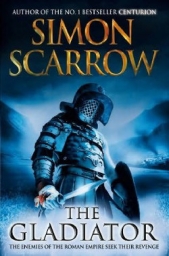The Gladiator

The Gladiator читать книгу онлайн
Внимание! Книга может содержать контент только для совершеннолетних. Для несовершеннолетних чтение данного контента СТРОГО ЗАПРЕЩЕНО! Если в книге присутствует наличие пропаганды ЛГБТ и другого, запрещенного контента - просьба написать на почту [email protected] для удаления материала
'Don't worry, sir,' Macro replied firmly. 'I'm happy to do it. For you, and for Cato.'
'Thank you.' Sempronius stood up and crossed the room to the window, where he clasped Macro's arm. 'You're a good man. One of the best.'
'I said I'd do it, sir. You don't have to go on about it.'
Sempronius laughed. 'Very well. Go now. Take your pick of the men, the best of the horses and enough rations for the journey.
Report back to me as soon as you return.'
'Yes, sir.' Macro nodded, and Sempronius released his arm. As Macro made for the door, Julia stepped forward to embrace her father. Sempronius kissed the top of her head. He held her tight for an instant and then let her go. She turned away and hurried from the room without looking back.
Sempronius listened to the light patter of her sandals, soon lost under the harsh clatter of Macro's nailed boots, then both died away as they left the building. He took a deep breath to calm the pain in his heart and gazed out towards the twinkling sprawl of fires that marked the rebel camps.
'Cato, my boy,' he muttered to himself, 'for pity's sake don't fail me now.'
CHAPTER TWENTY-ONE
As dawn broke, Yannis woke Cato to point out a trailing column of smoke rising into the sky above the horizon. To their right, the Egyptian coast was two miles off, low-lying and almost feature-less, apart from the occasional cluster of small huts and fishing boats.
They had been sailing along the coast since putting in briefly at Darnis to take on water. There were no roads along the coast and Cato had been advised to continue the journey by sea. Once he had learned the rudiments of sailing, Cato and Yannis had taken it in turns to steer the fishing boat while the other Romans did their best to keep out of the way in the small, cramped and stinking craft. The weather had been fine and a westerly breeze meant that they made good time. There had been no need to put in to land each night after leaving Darnis since the moon had lit their way, sparkling dully off the sea. Even though they had made good progress, Cato was fretful, his mind constantly occupied with concern for his friends back in Gortyna. Indeed, he had been dozing, thinking of Julia, when Yannis had shaken his shoulder gently, and now the fisherman looked amused as Cato stirred, won de ring what he had just muttered.
'Yes, what is it?'
'We're in sight of the lighthouse. I thought you'd want to know.'
Cato scrambled stiffly up from the side of the boat and balanced his feet against its motion as he stood beside Yannis. He saw the column of smoke at once, and the faint gleam of a polished surface at its base.' How far away are we?'
'I've heard that it's possible to see the top of the lighthouse from twenty or thirty miles away. I've been to Alexandria a few times, when I was a soldier. See that sparkle? That's a huge curved piece of brass, regularly polished. By day it reflects the light of the sun, and at night the flames of the fire that burns at the top of the tower.'
Cato had read of the great lighthouse at Alexandria and felt a tingle of excitement at the thought of seeing such an architectural marvel. From what he recalled, the lighthouse was only one of the landmarks of the city founded by the greatest general in history.
Alexandria was also filled with the most brilliant minds in the world, drawn to the vast collection of books in the Great Library. If there was time, Cato firmly resolved to see something of the city.
With a full sail bulging under the pressure of a stiff breeze, the fishing boat surged across the swell, and as the sun climbed into the sky, the other Romans stirred and watched the distant structure slowly crawl above the curve of the horizon. The hours passed and Cato pulled on his felt cap and tipped the fringe down to shield his eyes from the glare of the sun. By noon the port itself was clearly visible, and beyond, the vast expanse of the city. At the heart of Alexandria were the various complexes of temples, markets, palaces and the Great Library, huge edifices worthy of a city that had a population almost as great as that of Rome. Yannis pointed out the two harbours, the nearest of which had to be approached cautiously due to the dangerous shoals and rocks that lined its entrance. Scores of ships lay at anchor, or moored to the quay, where a multitude of tiny figures laden with cargo toiled between the ships and the long row of warehouses that faced the wharf.
Yannis steered the boat around Pharos island towards the second, smaller harbour. It was only as they approached the lighthouse built on to the end of the island that Cato fully appreciated the scale of the structure, built on the orders of the second Ptolemy. A vast square base with walls and low towers served as the platform for the main tower, which soared into the sky, over four hundred feet in height.
The first level was square, pierced with rows of windows. Above it was an eight-sided section leading up to the final, smallest level, which was round. The fire was housed in the upper floors of the highest level, and above that gleamed the huge brass reflector. There was a tiny flurry of white specks swirling about the top of the lighthouse as one of its keepers hurled scraps of food to the gulls.
Cato and the other Romans were stunned by the building. In all their lives they had seen nothing to compare to it, not even in Rome, with all its grand buildings. Yannis laughed at their awed expressions.
'Some what humbling, isn't it? Not so sure that Rome is the centre of the world any more?'
'I had no idea it was as magnificent as this,' Cato admitted.' How on earth could they have built it?'
He had been raised with the idea of Roman omnipotence. Rome was the greatest city, its people the greatest race, and its gods were the most powerful. He had not been fool enough to take this smugness at face value, but he had travelled the empire from Britain to Palmyra and seen nothing to compete with the magnificence of Rome. Until now.
The boat passed the end of Pharos island and a short while later Yannis altered course and headed into the port that opened out beyond the lighthouse. The wind was now abeam the fishing boat, and it heeled as Yannis adjusted his mainsheets. The main concentration of shipping was over to the right, and Cato saw a fleet of large vessels heading directly for them. Yannis altered course to avoid them.
'The grain fleet,' he explained.
Cato nodded as he examined the vessels more closely. They were built like the Horus, but on a larger scale, with high sides that bulged outwards. A purple pennant rippled from the top of each mast. He watched them as they sailed past with almost stately grace, as the faint swell had almost no effect on them. Each vessel was filled with grain destined for Rome, where it would feed the common people for the next four months while the fleet returned to Alexandria for the next consignment. Ever since the Emperor Augustus had finally annexed Egypt and made it into a Roman province, the fertile fields watered by the great river Nile had be come the breadbasket of Rome.
Unfortunately the mob had come to rely on the free handout, and successive emperors had not dared to put an end to the dole, no matter how much gold it cost them.
The courses of the fleet and the fishing boat diverged as Yannis steered the craft towards a small port at the base of the peninsula that protected the harbour. A fleet of Roman warships lay at anchor in the sheltered waters, and beyond them steps and ramps rose up from the sea towards a large palace complex.
'That's the old royal port,' said Yannis. And the palaces built by the Ptolemies. Except for that building to the right. That's the Great Library.'
Cato looked towards the building Yannis had mentioned. He had assumed that it was yet another palace, but now that he looked more closely he could see a steady stream of people moving in and out of the vaulted entrance. More were visible on the balconies on the upper floors, scanning racks of scrolls or talking in small groups.






















